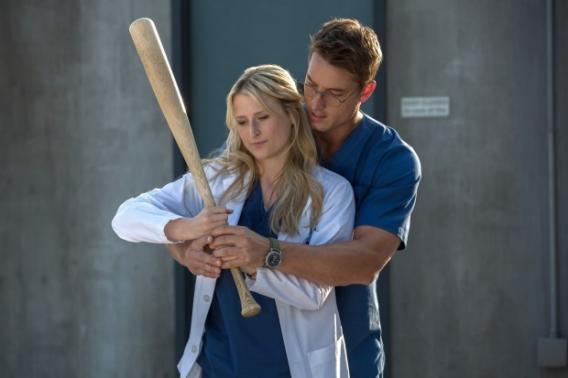As several critics have observed, Emily Owens, M.D., which premieres tonight on the CW, states its premise with all the subtlety of a defibrillator to the chest. As not one but two characters point out in the show’s first few minutes, “hospitals are a lot like high school.” The second person to make that observation even breaks down the parallel cliques: High-school jocks turn into orthopedic surgeons, mean girls go into “plastics,” the All-American girls become OB/gyns, the geeks gravitate toward neurology, rebels to the ER, stoners to anesthesia, and “sanctimonious churchgoers” to pediatrics.
But as obvious and annoying as the show may be, it’s hard to attack its conceptual framework. When it comes to television, hospitals are like high school—and that’s a good thing.
Some of TV’s greatest dramas, from Buffy the Vampire Slayer to Freaks and Geeks, were set in high school. The setting works because it evokes a specific time—which just happens to be a period of growth and experimentation—with a concrete place. And high school, unlike college, is a universal experience, like work (even in the current economic climate).
That’s why anyone who has ever started a new job will recognize the situation facing Emily Owens (Mamie Gummer), in the pilot: After 23 years of schooling, it’s her first day at a new job—a surgical internship at Denver Medical Center. She must make friends, impress her supervisors, and save lives.
A new intake of interns is like a new class of freshmen. And they work so hard that they can’t wander too far from the hospital, which makes for a realistically controlled setting. (This is another advantage shows about high-school kids have over those about college students, who are more mobile.) They’re also old enough for adult problems, which I appreciate: Surely I’m not the only viewer who has icked herself out realizing that I’m invested in the love life of someone pretending to be 16.
Theoretically at least, medical interns are smart and capable, too—and that’s where the problems with Emily Owens begin. It’s easy to believe that patients would confide in the show’s titular young doctor, despite—or maybe even because of—her awkwardness. Faced with a room full of medical automatons spouting jargon, I’d single out the human-seeming one to ask questions of, too. But at a certain point you need the doctor to know what she’s doing.
Toward the end of the show, Emily’s incessant voice-over declares, “I’m done feeling stupid and insecure about being stupid and insecure.” That sure makes it seem like she’s decided to accept that she’s stupid and insecure. I buy the insecure part. What is less convincing is that this doofus of a doctor, who spends rounds daydreaming about her crush, could save a patient’s life. And that’s the one place the high-school-show parallel falters. Those shows lionize the oddballs and losers—the kids who sing in the glee club or lost souls like Jordan Catalano—not the future surgeons of America. If, as she claims, Emily Owens is ready to enter “the next phase of my life,” she needs to get in touch with her inner Mathlete. Even Doogie Howser had to grow up.
